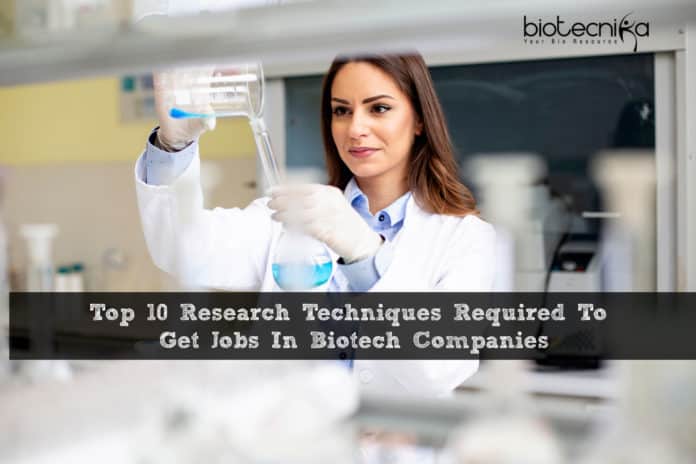Research Techniques Required To Get Jobs In Biopharma Companies – Top 10 List
There were times when having basic schooling was sufficient. Then, came the era when Graduation became a mandate. Afterward, postgraduate and doctoral degrees came into existence. These days, almost everyone is having a postgraduate degree or the highest of all qualifications, a doctorate. Obviously, these are giving rise to huge competition, when it comes to getting a good salaried job. Does that mean all our efforts have gone in vain! No, no that is not true. However, looking at the employer’s point of view, the one who has the best experience in the relevant field is considered worthy of his attention. So, what exactly is the requirement to be an ideal candidate in the eyes of the recruiter?
Let us have a look at certain research techniques which may assist you to build a strong career in the bio-companies, considering different types of bio-related companies.
Top 10 Research Techniques Required To Get Jobs In Biopharma Companies.
1. HACCP refers to Hazard Analysis Critical Control Point. It is an internationally accepted research technique to prevent chemical, microbiological and physical contamination along the food supply chain. This is done
by identifying the risks, establishing critical control points, setting critical limits, and ensuring control measures are validated, verified and monitored before implementation. The effective implementation of HACCP will enhance the ability of companies to: protect and enhance brands and private labels, promote consumer confidence and conform to regulatory and market requirements. All businesses (cereals, meat products, dairy products, fisheries, spices, and condiments, etc.) involved in the food supply chain from producers to retailers can use HACCP.For a job like Research Associate in the field of Food Science and Technology, one needs to have a good understanding of GMP, FDA, FSSAI, HACCP compliances. Additionally, they should be able to design & execute lab experiments/pilot scale and factory scale trials and to carry out meticulous planning and documentation of all scientific work. Usually, an experience of 4-6 years counts. Now, what kind of students can have an understanding of these compliances? A PDF from cancer background? Of course, not. However, if someone does not have any prior experience in this field, they can still opt for a certification course from the National Centre for HACCP Certification. This involves Application for certification, pre-assessment, training, document review, certification audit and getting a certificate. Similarly, certificate courses for cGMP and FDA are offered by CfPA (The Center for Professional Advancement).
2. General molecular biology techniques pertaining to cloning and gene expression and also should be conversant with bioinformatic approaches to oligonucleotide design, in silico cloning, identifying genes and the use of basic alignment tools are also an essential requisite to be a part of the R & D team. Usually, a research candidate is required to work in multidimensions. But completing a Ph.D. does not necessarily mean that you will have the whole of skill set. But you can always get hands-on training via workshops.
3. Chromatographic techniques like Normal Phase and Reversed Phase chromatography are easier to understand concept-wise, however, in-practise it takes time to carry out standardization and getting the equipment running and damage-free. The issue being, no one is going to have you handle the instrument by yourself. In the prominent laboratories like PU, NCL, as well, there is only provided to submit the sample and get it analyzed by the technician. Companies like Piramal Healthcare look for candidates either as an apprentice or permanent positions, who are required to have sound experience in basic protein purification and characterization work via chromatography techniques alongside basic immunohistochemistry techniques and ELISA assays.
4. To be a Quality Control Analyst, the basic requirement is to have an understanding of research techniques related to Microbiology, Biochemistry, and Biotechnology. Additionally, they demand the experience of Developmental Quality Assurance, review of Batch Manufacturing records of biological drug substance and drug product, knowledge of Change Control, Deviations, Investigation, CAPA, etc. QC Inspector, Manager Quality Control and Safety, QC Officer, Quality Engineer, etc. are some jobs which can be easily grabbed by having a hand on practice as well as theoretical knowledge in this field. Companies like Thomson Reuters, Reliance, Godrej, ITC, Unilever, etc. are willing to pay a salary ranging from Rs. 159000 to Rs. 767000/- pa in India, based on expertise and experience.
5. Ability to handle large data: Artificial Intelligence or Big Data handling is another need of the hour. We need skilled workers who can manage data in top biopharma companies working in the areas of genomics, the human microbiome, crowdsourcing, drug designing, and clinical data. Varied companies are involved in handling courses related to Artificial Intelligence both offline and online. To name a few Amazon, Siemens Technology, Gartner India Research & Advisory Services, Accenture and Microsoft. They are actively looking for highly experienced ML Specialists, developers and engineers and are ready to pay anywhere between 1 Lakh to 3 Lakh monthly salary.
6. Statistics: Whatever may be the number of software which has occupied the market today, human intelligence and discretion remain unmatched. Although every master and doctoral research involves less or more of statistics, additional expertise is needed to get a job. Madurai Kamaraj University offers one year PG diploma in Biostatistics. Companies like Monsanto require Ph.D. candidates with a background in Plant Pathology, Plant Sciences, Genetics, and Plant Breeding, Quantitative Genetics, Statistical Genetics, Molecular Breeding, or related fields.
7. Bioinformatics: As a Genomic Scientist, one needs to have information about at least one programming language like Perl or Python or Ruby. They should have sound experience in R and Shell scripting, ideally to the level of handling large scale NGS datasets as well. Ideal candidate is the one with past experience in analyzing human WGS & WES data, detailed and updated knowledge of advanced Germline and Somatic NGS data analysis related tools for SNV, CNV and SV calling and databases for variant interpretation alongside experience in mathematical modeling, statistics/ multi-omics integrative analysis/ machine learning experience or knowledge in interpreting NGS data. These are quite high paying jobs ranging from 8 – 10 lakh per year. CADD, Modeling, Docking and many such techniques exist in the Bioinformatics field which can be mastered for high pay scale jobs. So, how do you get expertise in these fields? Again there are certificate and diploma courses available at Biotecnika.
8. Clinical Research Associate Certification: Other than having basic degree in the related field one must have relevant research experience. e.g. CCRP (Certified Clinical Research Professionals) provides 4 such courses, viz. Clinical Research Associate Certification, ICG GCP Certification, Clinical Trials Assistant Certification and Accelerated Clinical Research Associate Certification, the prices for which range between 150 USD to 2995 USD.
9. Spectroscopic techniques are having wide applications in every field. These may include the either very simple type of UV-Visible spectrometry, or very complex techniques like Nucleic Magnetic Resonance, Circular Dichroism, Surface Plasmon Resonance, etc. All of these need deep knowledge of related software, related techniques as well as hands-on practice. Since these instruments are expensive, these need trained personnel. These techniques are needed to find out the structural details of molecules and compounds.
10. Nanobiology is another yet emerging field that may provide better employment chances. As stated before, it is not possible for each one of us to get hands-on practice in the nanotechnology research techniques, still, we can complete a course in nanobiology. This will cover everything from basics in the field of biological nanoparticles to use and fabrication. Synthesis and characterization of nanoparticles, nanofabrication include few of such techniques. Even the starting monthly salary ranges from Rs. 30,000 to Rs. 60,000/- in this field. Besides, there is always scope for other perks and benefits and a higher salary in multinational companies. Of course, being a faculty is the most loved option but companies like Nano serendipity, Nanobiz, Aaxis Nano Technologies, as well as institutes like Institute of Nano Science and Technology are always ready to accept candidates with these skills.
So here we are with the Top 10 List of Research Techniques Required To Get Jobs In Biopharma Companies. While the above-listed research techniques are the most trending ones which Employers are currently seeking in candidates, yet there are many more research techniques & skills available which one can acquire knowledge of. These are a few of the techniques which can lead you to a successful career path. There are a plethora of such opportunities available in the market which can assist you in building a resume strong enough to catch the attention of the recruiter and grab a highly paid job.
 Dr. Preeti Saini is Ph.D. in Soil Microbiology from Punjab Agricultural University, Dr. Saini wears many hats at BioTecNika. She is involved in designing Courses, coordinating conferences and loves to educate her students about the latest from the world of Life Sciences. This article penned by her is about Research Techniques Required To Get Jobs In Biopharma Companies.
Dr. Preeti Saini is Ph.D. in Soil Microbiology from Punjab Agricultural University, Dr. Saini wears many hats at BioTecNika. She is involved in designing Courses, coordinating conferences and loves to educate her students about the latest from the world of Life Sciences. This article penned by her is about Research Techniques Required To Get Jobs In Biopharma Companies.






































Jobs in Food and Dairy Industries
I got my UGC-CSIR letter and it says that payment will be only ₹16000/pm for Jrf and ₹18000/pm for srf. Pls explain me why it is so..
Ma’m pls kindly relpy me with my with clarification.
I am a farmer I have developed some veraity of Paddy which produce Germinated Brown Rice.
This Paddy is highly tolerance to climate change having highelding highly nutritious highly medicinal and also high dormacy by nature.
This Paddy is the natural mix genetic of wild and commercial rice.
This experiment based on mythological cultivation of mythological wild Paddy genetic and commercial Paddy.
This rice will protect Colon Cancer type 2 diabetic constipation cholesterol disorder mensuration disorder and so many disease of human being.
Cultivation of this Paddy in organic methodological practice this will decrease co2 from atmosphere and methen emissions will low.
Thanks
Please ug jobs beer and wine industry
For learning Big data handling and AI ..which is the best institute. Please help me in choosing..I am Sucharitha…done M.sc in biotechnology .i live in Hydarabad.
Another beautifully informative article from Dr. Preeti Saini. I follow the updates on this website and the articles written by her are the most informative with direct and relevant information.
Thanks again for this. Surely helped me a lot.
i hold M.tech in molecular medicine…what should i do to get relevant job?